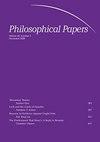States Are Not Basic Structures: Against State-Centric Political Theory
IF 1.3
3区 哲学
0 PHILOSOPHY
引用次数: 22
Abstract
Abstract Contemporary political philosophy often operates on a ‘two-tiered’ theoretical treatment of global politics, on which domestic political systems and the principles governing their internal dynamics constitute one tier, and on which the relationships between states and governing multinational institutions constitute a second. One way of grounding and justifying this approach, preferred by Rawls, is called constructivism. Constructivists describe the world as containing specific domains and domain-types of political and social interaction, and relativizes principles of justice to important versions of these—states, in the case of contemporary two-tiered political philosophy. In this paper I argue against the specifically Rawlsian account of uniting these three commitments (two-tiered political theory, constructivism, and statism) and gesture towards a general argument against the coherence of this bundle of views.国家不是基本结构:反对国家中心政治理论
当代政治哲学通常对全球政治进行“双层”理论处理,其中国内政治制度和支配其内部动态的原则构成一层,国家之间的关系和治理跨国机构构成第二层。罗尔斯偏爱的一种为这种方法提供基础和证明的方法,被称为建构主义。建构主义者将世界描述为包含政治和社会互动的特定领域和领域类型,并将正义原则相对于这些国家的重要版本,在当代双层政治哲学的情况下。在本文中,我反对罗尔斯将这三种承诺(两层政治理论、建构主义和国家主义)统一起来的具体描述,并倾向于对这一系列观点的连贯性进行一般性论证。
本文章由计算机程序翻译,如有差异,请以英文原文为准。
求助全文
约1分钟内获得全文
求助全文
来源期刊

Philosophical Papers
PHILOSOPHY-
CiteScore
2.10
自引率
0.00%
发文量
18
期刊介绍:
Philosophical Papers is an international, generalist journal of philosophy edited in South Africa Original Articles: Articles appearing in regular issues are original, high-quality, and stand-alone, and are written for the general professional philosopher. Submissions are welcome in any area of philosophy and undergo a process of peer review based on initial editor screening and refereeing by (usually) two referees. Special Issues: Topic-based special issues are comprised of both invited and submitted papers selected by guest editors. Recent special issues have included ''Philosophy''s Therapeutic Potential'' (2014, editor Dylan Futter); ''Aging and the Elderly'' (2012, editors Tom Martin and Samantha Vice); ''The Problem of the Criterion'' (2011, editor Mark Nelson); ''Retributive Emotions'' (2010, editor Lucy Allais); ‘Rape and its Meaning/s’ (2009, editor Louise du Toit). Calls for papers for upcoming special issues can be found here. Ideas for future special issues are welcome.
 求助内容:
求助内容: 应助结果提醒方式:
应助结果提醒方式:


